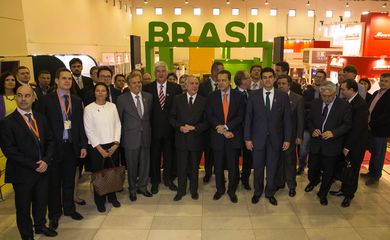Brazil and Russia discuss nuclear partnerships




Control center at the generation 3+ nuclear plant in Novovoronezh, regarded as the world's most advanced of its kind
Brazil and Russia are discussing potential nuclear energy deals that may be completed in the near future. Recognized worldwide for its nuclear technology, Russia has been making heavy investments in nuclear technology, especially in developing countries. The country has just hosted the world's biggest nuclear power conference, AtomExpo 2016, bringing together thousands of participants from 50 countries in Moscow in the first week of June.
The event was sponsored by Russia's state-owned nuclear energy corporation ROSATOM, which invited dozens of international journalists to the event, including from Agência Brasil. The visit included a tour of a generation 3+ nuclear plant in Novovoronezh, regarded as the world's most advanced. It is the same plant Russia has been trying to sell to Brazil since Brazil's President Dilma Rousseff, currently suspended, announced plans to build at least four nuclear power plants in the country by 2030.
According to ROSATOM executive Kirill Komarov, the economic and political crisis facing Brazil has not changed the Russian energy company's plans to increase partnerships with the country. “Nuclear energy should be beyond political issues, because Brazil's need for nuclear plants is huge. And despite the current situation, [negotiations] press ahead,” said Komarov.
“A month ago, we received an invitation from [Brazil's state-owned corporation] Eletronuclear to visit sites, provide consultancy, and help pick the most suitable locations for power plants. We are excited about Brazil's nuclear program and will be happy to join it,” he said.
Marcelo Gomes, New Nuclear Power Plant Development Advisor for Eletronuclear, said talks with different companies are at an early stage, but Russia has proved a qualified, experienced, and proactive partner. “Generation 3 plants have introduced innovations that make them safer. There are some very interesting projects for Brazil. We are finding out more about each other, the Russians have been very cooperative and we could see good results,” he said.
Under Brazil's Constitution, the State has the role of operating nuclear facilities and holds a monopoly on nuclear materials. But according to Gomes, the prospect of private companies building nuclear power plants can become a reality with Brazil's interim government. “This perception has been reflected in the words of the new minister [of Mines and Energy]. The hints we have been getting and the needs of the power sector indicate these projects are going ahead,” he said.
Angra 3
Gomes was also enthusiastic about talks with ROSATOM to complete Angra 3 [nuclear plant] in Rio de Janeiro state, whose construction project stalled due to compliance issues. Antonio Muller, chairman of the Brazilian Association for the Development of Nuclear Activities (ABDAN), believes an alternative to complete Angra 3 would be Eletronuclear paying ROSATOM megawatt-hours to finish the project.
“Angra 3 is on the waterside and its metal enclosure stalled midway. Any further delays [to complete the project] will result in corrosion, which would be a major complication. The turbine project is nearly done. All we need is a quick solution,” Muller warned.
He also believes that the time is ripe for changes in Brazil's legislation. “Crises provide opportunities. I believe we must end the [state] monopoly, no business will agree to be a partner in such a big venture if Eletronuclear remains the controlling stakeholder. We must make a decision a.s.a.p. or face power shortages,” he said.
Russia is building 34 nuclear power plants worldwide, which makes it an industry leader. Its main competitors in nuclear power include the United States, China, Korea, and France. Jakub Godzimirski, an expert in Russian energy policy from Norway, says Latin America lacks expertise in nuclear technology, which makes it an attractive market for Russia. According to him, nuclear technology is also vital for Russia to produce more energy and ensure the safety of its nuclear weapons.
*The reporter traveled at the invitation of ROSATOM, Russia's state-owned nuclear energy corporation.
Translated by Mayra Borges
Fonte: Brazil and Russia discuss nuclear partnerships





